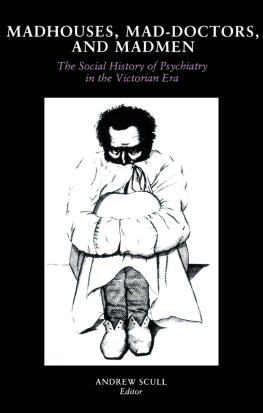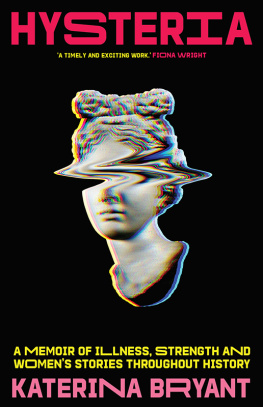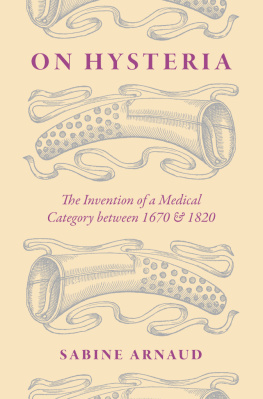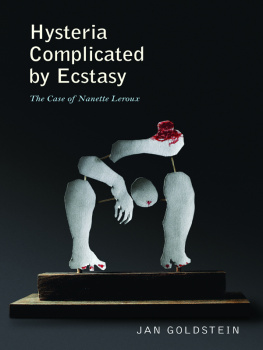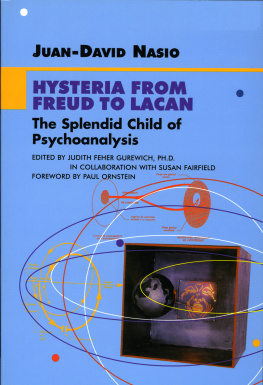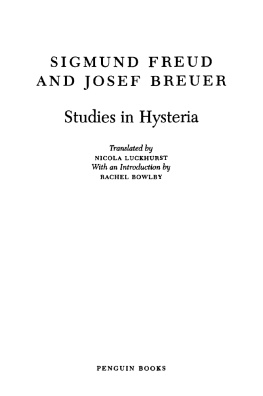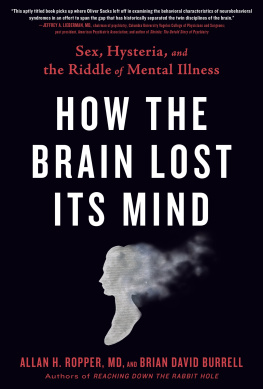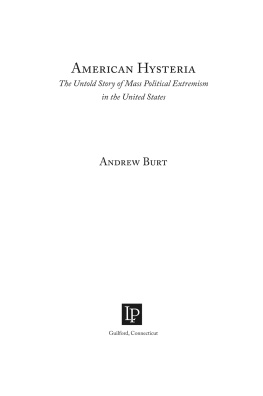HYSTERIA
Andrew Scull is Distinguished Professor of Sociology and Science Studies at the University of California, San Diego. He has written extensively on the history of psychiatry for more than three decades. His previous publications include Museums of Madness: The Social Organization of Insanity in 19th Century England (Penguin, 1982), The Most Solitary of Afflictions: Madness and Society in Britain, 17001900 (Yale, 1993), and Madhouse: A Tragic Tale of Megalomania and Modern Medicine (Yale, 2005). He also writes regularly for the TLS and for such journals as The Lancet and Brain.
Praise for Hysteria
Sculls book is a wonderful, lucid exposition of this story well writtenat times funny and at other times cuttingand in almost every chapter provoking of further questions about the nature of medicine, medical practice, and human identity.
Stephen Casper, Social History of Medicine
Much more than a superior work of historical synthesis. Scull expertly traces the story of hysteria as concept, diagnosis, cultural expression and lived experience, from the sixteenth century to the twenty-first, and sheds new light and offers new insights throughout. As an introduction to the turbulent and contested history of this most mutable but strangely enduring of disorders, Sculls book could not be bettered.
Ralph Harrington, Metapsychology
HYSTERIA
The Disturbing History
Andrew Scull


Great Clarendon Street, Oxford OX2 6DP
Oxford University Press is a department of the University of Oxford.
It furthers the Universitys objective of excellence in research, scholarship,
and education by publishing worldwide in
Oxford New York
Auckland Cape Town Dar es Salaam Hong Kong Karachi
Kuala Lumpur Madrid Melbourne Mexico City Nairobi
New Delhi Shanghai Taipei Toronto
With offices in
Argentina Austria Brazil Chile Czech Republic France Greece
Guatemala Hungary Italy Japan Poland Portugal Singapore
South Korea Switzerland Thailand Turkey Ukraine Vietnam
Oxford is a registered trade mark of Oxford University Press
in the UK and in certain other countries
Published in the United States
by Oxford University Press Inc., New York
Andrew Scull 2009
The moral rights of the author have been asserted
Database right Oxford University Press (maker)
First published 2009
First published in paperback 2011
All rights reserved. No part of this publication may be reproduced, stored in a retrieval system, or transmitted, in any form or by any means, without the prior permission in writing of Oxford University Press, or as expressly permitted by law, or under terms agreed with the appropriate reprographics rights organization. Enquiries concerning reproduction outside the scope of the above should be sent to the Rights Department, Oxford University Press, at the address above
You must not circulate this book in any other binding or cover
and you must impose the same condition on any acquirer
British Library Cataloguing in Publication Data
Data available
Library of Congress Cataloging-in-Publication Data
Scull, Andrew T.
Hysteria : the biography / Andrew Scull.
p.; cm.
Includes bibliographical references and index.
ISBN 978-0-19-956096-7 (hardback : alk. paper) 1. HysteriaHistory. I. Title.
[DNLM: 1. Hysteriahistory. 2. History, Modern 1601-. WM 11.1 S437h 2009]
RC532.S38 2009
616.8524dc22 2009026410
Typeset by SPI Publisher Services, Pondicherry, India
Printed in Great Britain
on acid-free paper by
Clays Ltd, St Ives plc
ISBN 9780199560967 (Hbk.)
ISBN 9780199692989 (Pbk.)
1 3 5 7 9 10 8 6 4 2
CONTENTS
. The Suffocation of the Mother
. George III taking the waters at Cheltenham
. Thomas Willis
. George Cheyne
. A group of patients mesmerized by Franz Anton Mesmer himself in Paris, 1778
. Robert Brudenell Carter
. Silas Weir Mitchell
. Charlotte Perkins Gilman
. Jean-Martin Charcot
. The first phase of Charcots grand hystrie
. Clownisme, Charcots second stage of a hysterical attack
. Attitudes passionelles, the third phase of grand hystrie
. Blanche Wittman
. Augustine
. Anna O., or Bertha Pappenheim
. Sigmund Freud
. Dora (Ida Bauer) with her brother Otto
PROLOGUE:
Suffocation of the Mother
London, Friday, April 30, 1602. The last year of Elizabeth Is reign. A 14-year-old girl, Mary Glover, the daughter of a well-to-do shopkeeper, left her house on Thames Street to run an errand for her mother. She soon arrived at her destination, the house of Elizabeth Jackson, a neighbor with whom she had quarreled in the past, where she sought to deliver her message. Seizing the opportunity, however, the old woman drew the teenager indoors, locked the dore upon her, and rained down imprecations and threats on the young girls head, cursing her for damaging her reputation in the community and for meddling with her own daughters apparel, and wishing an evill death to light upon her. For upwards of an hour, the old crone ranted and raved at Mary, till finally she relented and let her go, with the parting injunction that My daughter shall have clothes when thou art dead and rotten.
Understandably, the encounter left young Mary pale and shaken. Savoring her triumph, Elizabeth Jackson crowed to a servant in the house next door, Elizabeth Burges, that she had ratled up the young creature, and added: I hope an evill death will come unto her.not content with her first round of curses, Jackson showed up at the Glovers shop, ostensibly to see Marys mother. Glaring and snarling at the girl as she sat drinking a posset, she spoke harshly to her, then abruptly turned on her heel and left.
Immediately seized by a choking sensation, Mary found she could no longer swallow her posset. Her throat seemed to swell and close, though not enough to inhibit her breathing. She went to a family friend for help, only to find herself speechles and blynde.
Gods vengeance apparently did not stretch so far as to cause Marys demise, but over the following weeks, the fits continued, and eventually got worse. Eating proved difficult. To keep her alive, nutrients were periodically thrust down Marys throat. (She had developed a preternatural capacity to have fingers or instruments thrust far down her gullet without gagging.) Next, she developed a paralysis of a hand, then an arm, and then of her whole left side. Her belly swelled. Further periods of blindness and inability to speak were accompanied by more swelling of the throat. The fits seemed worse every other day, but always came on when she tried to eat.
On two occasions she encountered Mistress Jackson, first in the shop, and then at church, after which her symptoms took a still more dramatic turn:
The weeks that followed were beset with other writhings and contortions of the body; dancings and prancings; movements in slow motion into postures that seemed impossible to sustain; strange patterns of breathing and alterations of countenance; many strange anticke formes of the mouth, distortions, gapings and blastings, accompanied by odd vocalizations; while, at other times, she mimed shooting a bow and arrow or plucking at the strings of a harp, yet seemed dumbe, blynde, and senseless. In the midst of her fits, she at times shouted out her gratitude to God, and called upon Him to deliver her from her afflictions. As word spread of these dramatic posturings, crowds of pious Puritans, augmented by the skeptical and the curious, gathered to view the spectacle.
Next page

